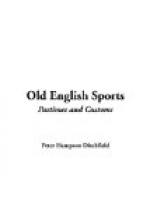“Come, my Corinna, come,
and coming mark
How each field turns
a street, and each street a park,
Made green and trimmed
with trees; see how
Devotion gives each
house a bough
Or branch; each porch,
each door, ere this
An ark, a tabernacle
is
Made up of white-thorn
neatly interwove.”
The men blew cow-horns to usher in the spring, and the maids carried garlands to hang them in the churches; while at Oxford the choristers of Magdalen College assemble at the top of the tower at early dawn, and sing hymns of thankfulness because spring has come again. This pleasing custom is still observed every year on the first of May.
But let us away to the village green, where the May-pole is being adorned with a few finishing touches, and is covered with flowers and ribbons. It has been carried here by twenty or thirty yoke of oxen, their horns decorated with sweet flowers, and then, with shouts and laughter, and with song, the young men raise the massive pole with handkerchiefs and flags streaming on the top, and the rustic feast and dance begin.
“The May-pole is up,
Now give me the cup,
I’ll drink to the garlands around it;
But first unto those
Whose hands did compose
The glory of flowers that crown’d it."[9]
A company of morris-dancers approach, and a circle is made round the May-pole in which they can perform. First comes a man dressed in a green tunic, with a bow, arrows, and bugle-horn, who represents Robin Hood, and by his side, attended by some maidens, walks Maid Marian, the May Queen.[10] Will Stukeley, Little John, and other companions of the famous outlaw, are represented; and last, but not least, comes the hobby-horse—a man with a light wooden framework representing a horse about him, covered with trappings reaching to the ground, so as to prevent the man’s feet from being seen. The hobby-horse careered about, pranced and curveted, to the great amusement of the company. The morris-dancers are adorned with bells, which jingle merrily as they dance. But a formidable-looking dragon approaches, which hisses and flaps his wings, and looks very fierce, making the hobby-horse kick and rear frantically. When the animals have wearied themselves, the maidens dance again, and the archers set up their targets on the lower end of the green, where a close contest ensues, and after many shots the victor is crowned with a laurel wreath.
Such were some of the sights and sounds of May Day in olden times. But the Puritans, who slew their king, Charles I., were very much opposed to all joyousness and mirth, and one of their first acts when they came into power was to put down the May-pole. They ordered that all May-poles (which they called “a heathenish vanity, generally abused to superstition and wickedness”) shall be taken down by the constables and churchwardens, and that the said officers be fined five shillings till the said May-poles be




